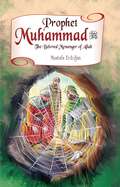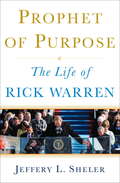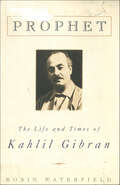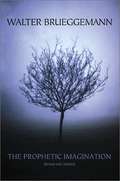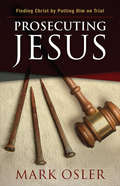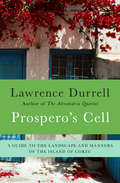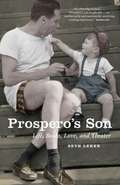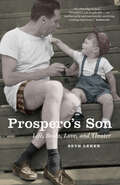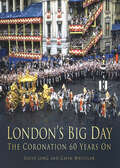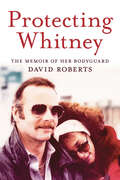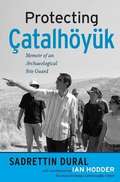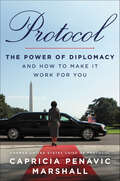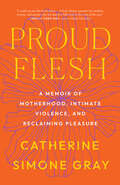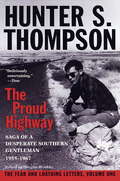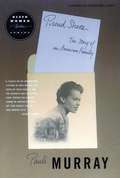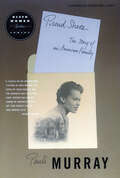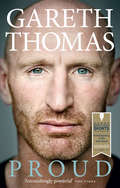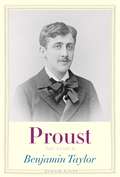- Table View
- List View
Prophet Muhammad: The Beloved Messenger of Allah
by Mustafa ErdoganThis book is a short summary of Prophet Muhammad's life for the younger readers. It presents major milestones in the life of the Prophet with an easy to understand style in line with the mainstream Islamic tradition. It is also a great bedtime story book for interested families who want to read from the life of the Prophet.
Prophet With Honor, Kids Edition: The Billy Graham Story (ZonderKidz Biography)
by William C. MartinHis Message Would Be Heard Around The WorldNo one guessed he would change the world. A simple country farm boy once prayed that God would use him…and prayed…and prayed. And God did use him, beyond what he ever imagined. He grew into a man who would lead millions of people to Christ, a man who would be known as the greatest evangelist of our time. Come read the story of Billy Graham and follow his life from his days as a boy, who wasn’t so great in school, to a man who would teach the world the greatest lesson of all: how to know and live for Christ.
Prophet of Purpose: The Inside Story of Rick Warren and His Rise to Global Prominence
by Jeffrey L. ShelerRick Warren is arguably the most influential man in American religion today. Megachurch pastor, friend of world leaders, and trend-setting spiritual entrepreneur, he is widely recognized as the new public face of evangelical Christianity in America. No other modern churchman has matched his success as a leader and motivator of Christians. His book, The Purpose-Driven Life, is the bestselling nonfiction hardcover of all time, with more than 25 million copies sold. At a time when evangelicalism stands at a political and cultural crossroads, his stature continues to rise.But who is Rick Warren? What can be learned from the story of the man behind the message? And what does his life say about the state of Christianity today?Prophet of Purpose: The Life of Rick Warren traces the road Warren has traveled, the influences in his life, his trials and temptations, and the opposition he has encountered along the way. Honest, thorough, and insightful, it explores his spiritual coming of age during the turbulent 1960s, his principled determination to sit out the divisive battles between fundamentalists and moderates in the Southern Baptist Convention in the late 1970s, and his audacious endeavor in the 1980s to build a "church for people who hate church" in the suburbs of Los Angeles. From a handful of worshippers meeting in a tiny apartment, he grew a vibrant congregation of over 22,000 and a global network of pastors who follow his strategies for building churches and transforming lives. In this unofficial biography, Jeffery L. Sheler, who had unfettered access to Warren and those closest to him, presents an intimate portrait of Warren as a man of faith and vision but also of flesh and blood and human foibles-a pastor, communicator, philanthropist, and family man who is driven by a sense of divine purpose to complete the course his God has set before him.Prophet of Purpose brings Warren and his mission to life and provides a provocative glimpse into the potential future of Christianity in America.From the Hardcover edition.
Prophet: The Life and Times of Kahlil Gibran
by Robin WaterfieldBorn in the mountains of northern Lebanon, Kahlil Girbran (1883-1931) - mystic, society philosopher, author of one of the most enduring works of the 20th century, The Prophet - immigrated to the United States in 1895. A gifted artist, who specialized in painting for some years before he turned to writing, Gibran - although initially spurned by those whose approval he sought - was in time beloved by a number of prominent avant-gardists and hobnobbed with the rich and famous of Henry James's turn-of-the-century Boston. He then set his sights on the bohemian world of Greenwich Village in its early heyday before World War I.Gibran is known for the peace and optimism that permeates his work. Paradoxically, however, his life was littered with personal tragedies, conflicted sexuality, and deep heartache. Robin Waterfield skillfully traces Gibran's development from wounded Romantic and angry young man to his final metamorphosis as the Prophet of New York and shows what influences - psychological, social, and literary - led to these various phases. In fact, the road to the extraordinary success of The Prophet was not smooth or peaceful and tragically, Gibran himself did not live to see the phenomenal sales the book subsequently achieved. A complete reappraisal of all the remaining primary sources on Gibran's life and character, PROPHET is a brilliant work that reveals this Svengali-like guru of the New Age as a deeply unhappy, even tortured man.
Prophetic Imagination
by Walter BrueggemannIn this challenging and enlightening treatment, Brueggemann traces the lines from the radical vision of Moses to the solidification of royal power in Solomon to the prophetic critique of that power with a new vision of freedom in the prophets. Here he traces the broad sweep from Exodus to Kings to Jeremiah to Jesus. He highlights that the prophetic vision not only embraces the pain of the people but creates an energy and amazement based on the new thing that God is doing.
Prophets: Preachers for God
by Tom McminnFrom the author to the readers: "God used spokesmen called prophets in a special way. He wanted all people to know he loved them and would provide for them if they remained faithful to him and obeyed his laws." The writer associates each prophet with the message he told the people:" Elisha" emphasized that " God will provide for our needs"; "Amos" wanted people to "Seek good, not evil"; "Jeremiah" wanted people to "Be faithful to God and obey his laws"; "Jonah" showed that "God's love is for all people;" and "Micah" told the people that "God will provide a deliverer." In the book, McMinn writes about each prophet in terms of their unique purpose. After writing about a prophet, McMinn asks the readers a question that is designed to encourage them to explore their thoughts and feelings about each prophet. The questions also ask the readers to apply their insights to their own lives.
Prosecuting Jesus: Finding Christ By Putting Him On Trial
by Mark OslerWho is Jesus? Christians have been arguing about the answer to that question since there have been Christians, and it seems unlikely that they're going to agree on an answer anytime soon. Mark Osler, always a bit uncomfortable in church, was never able to find a Jesus that seemed real to him--until he put Jesus on trial. <P><P>Drawing on his training as a federal prosecutor and professor of law, he and a group of friends staged the trial of Jesus for their church, as though it were happening in the modern American criminal justice system. The event was so powerful that before long Osler received invitations to take it on the road. Each time he served as Christ's prosecutor, the story of Jesus opened up to him a bit more. <P><P>Prosecuting Jesus follows Osler in this extraordinary journey of discovering himself by discovering Jesus. Juxtaposing things we rarely put together, like the passion of Christ and our ideas about capital punishment, Osler explores an active engagement between Jesus and our contemporary law and culture.
Prospero's Cell: A Guide to the Landscape and Manners of the Island of Corfu (Faber Library #No. 20)
by Lawrence DurrellFrom a member of the real-life family portrayed in The Durrells in Corfu, this memoir of the idyllic Greek island is &“among the best books ever written&” (The New York Times). Before Lawrence Durrell became a renowned novelist, poet, and travel writer, he spent four youthful years on Corfu, an island jewel with beauty to match the long and fascinating history within its rocky shores. While his brother, Gerald, was collecting animals as a budding naturalist, Lawrence fished, drank, and lived with the natives in the years leading up to World War II, sheltered from the tumult that was engulfing Europe—until finally he could ignore the world no longer. Durrell left for Alexandria, to serve his country as a wartime diplomat, but never forgot the wonders of Corfu. In this &“brilliant&” journey through that idyllic time and place, Durrell returns to the land that made him so happy, blending his love of history with memories of his adventures there (The Economist). Like the blue Aegean, Prospero&’s Cell is deep and crystal clear, offering a perfect view straight to the heart of a nation.
Prospero's Son: Life, Books, Love, and Theater
by Seth Lerer“This book is the record of a struggle between two temperaments, two consciousnesses and almost two epochs. ” That’s how Edmund Gosse opened Father and Son, the classic 1907 book about his relationship with his father. Seth Lerer’s Prospero’s Son is, as fits our latter days, altogether more complicated, layered, and multivalent, but at its heart is that same problem: the fraught relationship between fathers and sons. At the same time, Lerer’s memoir is about the power of books and theater, the excitement of stories in a young man’s life, and the transformative magic of words and performance. A flamboyantly performative father, a teacher and lifelong actor, comes to terms with his life as a gay man. A bookish boy becomes a professor of literature and an acclaimed expert on the very children’s books that set him on his path in the first place. And when that boy grows up, he learns how hard it is to be a father and how much books can, and cannot, instruct him. Throughout these intertwined accounts of changing selves, Lerer returns again and again to stories—the ways they teach us about discovery, deliverance, forgetting, and remembering. “A child is a man in small letter,” wrote Bishop John Earle in the seventeenth century. “His father hath writ him as his own little story. ” With Prospero’s Son, Seth Lerer acknowledges the author of his story while simultaneously reminding us that we all confront the blank page of life on our own, as authors of our lives.
Prospero's Son: Life, Books, Love, and Theater
by Seth Lerer“This book is the record of a struggle between two temperaments, two consciousnesses and almost two epochs.” That’s how Edmund Gosse opened Father and Son, the classic 1907 book about his relationship with his father. Seth Lerer’s Prospero’s Son is, as fits our latter days, altogether more complicated, layered, and multivalent, but at its heart is that same problem: the fraught relationship between fathers and sons. At the same time, Lerer’s memoir is about the power of books and theater, the excitement of stories in a young man’s life, and the transformative magic of words and performance. A flamboyantly performative father, a teacher and lifelong actor, comes to terms with his life as a gay man. A bookish boy becomes a professor of literature and an acclaimed expert on the very children’s books that set him on his path in the first place. And when that boy grows up, he learns how hard it is to be a father and how much books can, and cannot, instruct him. Throughout these intertwined accounts of changing selves, Lerer returns again and again to stories—the ways they teach us about discovery, deliverance, forgetting, and remembering. “A child is a man in small letter,” wrote Bishop John Earle in the seventeenth century. “His father hath writ him as his own little story.” With Prospero’s Son, Seth Lerer acknowledges the author of his story while simultaneously reminding us that we all confront the blank page of life on our own, as authors of our lives.
Protect and Keep: The Coronation of Queen Elizabeth II
by David Long Gavin WhitelawThe summer of 2022 saw the celebration of the seventieth anniversary of Queen Elizabeth II’s coronation, the first time in British history that a monarch has reached this remarkable milestone.As the event was the first of its kind to be televised, images from the ceremony inside Westminster Abbey are instantly recognisable. Far less familiar are the scenes in the streets outside, where huge crowds assembled to see a procession of state coaches and historic regiments marching past public buildings festooned with patriotic banners and colourful grandstands erected outside many famous landmarks.Using a private collection of more than 200 rare images of London’s West End, Protect and Keep looks back to the day that the Queen pledged herself to her country. It provides a unique and precious record of an historic occasion: the day of the Coronation as it was seen by ordinary members of the public.
Protecting Diana : A Bodyguard's Story
by Lee SansumThis is the story of an ex-Royal Military Policeman, martial arts champion, and expert in close protection who found his way to the top of his profession, protecting the most famous woman in the world, Princess Diana. Through his assignment as protection for Mohamed and Dodi al-Fayed, he became guard and confidante to the Princess of Wales and the young princes, particularly Harry, and in Protecting Diana he details the weeks leading up to her tragic death. By chance, Sansum was not in Diana&’s car the night of the accident, but it still proved to be a turning point in his own life. His career would continue with some glamorous assignments like guarding Nicole Kidman, Tom Cruise, Pelé, and Sylvester Stallone, but his job was far from easy. He also joined the Royal Military Police, where he faced the deadly Irish Republican Army in the "Bandit Country" of South Armagh, before entering the world of private security and operating in hotspots such as Libya and Somaliland. Through protection of Princess Diana and his other high-pressure jobs where lives were at stake, Sansum provides a candid account of quiet strength, and how reading a situation is invaluable to getting out of trouble. He sets the example for achieving personal goals, overcoming trauma, and in doing so, honors one of the most outstanding figures of our age.
Protecting Whitney: The Memoir of Her Bodyguard
by David RobertsDavid Roberts was Whitney Houston's bodyguard, the real one. Roberts was hired in 1988 for Houston's UK portion of the Moment of Truth world tour. Accustomed to working for diplomats and Fortune 500 clients, Roberts had reservations about working with a pop star. But Houston's heart of gold won him over from the moment they met at Heathrow airport. There's a high bar for those who work in this business: you must be willing to die for your boss. Houston made that easy. Roberts got to travel the globe with one of the most fun-loving and generous souls he'd ever met. His memoir reveals heartwarming anecdotes of life with one of the world's most recognizable stars, including privately shared moments such as the birth of Bobbi Kristina. But there are also shocking and heartbreaking revelations. Roberts was present for some of Houston's most challenging ordeals. And he was helpless as he watched those who claimed to love and support her look the other way because they saw her voice box as a cash machine. His heart was ultimately shattered as he witnessed her succumb to the one threat he could not protect her from: herself.
Protecting Çatalhöyük: Memoir of an Archaeological Site Guard
by Sadrettin Dural Ian HodderThey are essential to every major archaeological excavation but rarely acknowledged by the visiting researchers once the artifacts have been shipped. As part of the innovative, multivocal output from the famous Turkish Neolithic site of Çatalhöyük, we hear from one of the site guards, Sadrettin Dural, who tells the story of the excavation from the point of view of the 'Other'. He offers tales of the strange habits of archaeologists, describes the local in-fighting that scholars never see, and explains how scientists can be protected from the Yatirs, spirits of the dead who guard the mound. Ian Hodder, director of the Çatalhöyük project, provides explanatory notes for the reader and an interview with the author, exploring indigenous interpretations of ancient sites and the archaeologists who excavate them. For the archaeologist, this offers a revolutionary new viewpoint on their work. For the cultural anthropologist, Dural's role as site guard is only a small part of his life as a Turkish villager. The author recounts the daily lived experience of one man in a contemporary Turkish village, including changing economic strategies for supporting his family, brushes with the law, trips to the beach and the city, and Turkish phone sex.
Protocol: The Power of Diplomacy and How to Make It Work for You
by Capricia Penavic MarshallPresident Obama’s former United States chief of protocol looks at why diplomacy and etiquette matter—and how they can help you in everyday life.In her roles as chief of protocol for President Barack Obama and social secretary to President Bill Clinton and First Lady Hillary Clinton, Capricia Penavic Marshall not only bore witness to history, but she also facilitated it. From curating rooms to have an intended impact to knowing which cultural gestures earned trust, her detailed measures were superpower influences that laid the groundwork for successful diplomacy between leaders and tilted the advantage, always, in her team’s favor. Sharing unvarnished anecdotes of harrowing near misses and exhilarating triumphs, Marshall offers the master class in soft power.Praise for Protocol“A trusted friend and a trusted colleague. I can’t imagine anyone who has been a greater public servant.” —Hillary Clinton“Working with Capricia during the Obama administration was nothing short of wonderful! Her guiding hand and innovative methods laid the foundation for our successful diplomacy on the world stage.” —Valerie Jarrett, former senior advisor to Barack Obama and author of Finding My Voice“Fascinating. . . . An informative and often charming primer on a little-known—but vital—government post.” —Kirkus Reviews
Proud (Young Readers Edition): Living My American Dream
by Ibtihaj MuhammadThe inspiring all-American story of faith, family, hard work, and perseverance by Olympic fencer, activist, and Time"100 Most Influential People" honoree Ibtihaj MuhammadAt the 2016 Rio Olympics, Ibtihaj Muhammad smashed barriers as the first American to compete wearing hijab, and made history as the first Muslim-American woman to medal. But it wasn't an easy road--in a sport most popular among wealthy white people, Ibtihaj often felt out of place. Ibtihaj was fast, hardworking, and devoted to her faith, but rivals and teammates (as well as coaches and officials) pointed out her differences, insisting she would never succeed. Yet Ibtihaj powered on. Her inspiring journey from a young outsider to an Olympic hero is a relatable, memorable, and uniquely American tale of hard work, determination, and self-reliance.
Proud Flesh: A Memoir of Motherhood, Intimate Violence, and Reclaiming Pleasure
by Catherine Simone GrayA searing portrait of a mother&’s body—a resurrection and reclamation of pleasure after abuse, a study of intergenerational trauma, and a love letter to the bodies of women: as alive and unbound as the teeming Mississippi wilds that bear witnessFour months postpartum with her second child, Catherine Simone Gray is back at her doctor&’s office, surveying a childbirth wound that refuses to mend. Proud flesh: tissue that overheals to become its own wound. Pregnancy and motherhood had been physically vulnerable for Gray, but this renders her most intimate parts unrecognizable—like her body is no longer her own. Has it ever been her own?As she gets to know her body in its new form, she encounters, too, the girl she&’d been at seventeen. It was summertime in Mississippi—wild, pulsing with life—when a man coerced her into an abusive relationship that would dominate her life for four years.Told in parallel timelines, Proud Flesh grapples with the legacy of intimate partner violence in motherhood. With luminous prose and breathtaking viscerality, Gray makes legible the ways that abuse can imprint on our body and seethe undetected for years. She lays bare unspoken truths: that violence remaps how we connect with and care for our children. That the pains of our mothers—and our mothers&’ mothers—endure, and can prowl the edges of our stories too. That even amid pain, our bodies can teach us new truths about our capacity to heal and experience pleasure.Proud Flesh rewrites the body of the mother beyond the borders—bold, defiant, and heart-stoppingly true, it&’s an unputdownable memoir and a force of nature.
Proud Highway: Saga of a Desperate Southern Gentleman, 1955-1967
by Hunter S. Thompson Douglas Brinkley William J. KennedyHere, for the first time, is the private and most intimate correspondence of one of America's most influential and incisive journalists--Hunter S. Thompson. In letters to a Who's Who of luminaries from Norman Mailer to Charles Kuralt, Tom Wolfe to Lyndon Johnson, William Styron to Joan Baez--not to mention his mother, the NRA, and a chain of newspaper editors--Thompson vividly catches the tenor of the times in 1960s America and channels it all through his own razor-sharp perspective. Passionate in their admiration, merciless in their scorn, and never anything less than fascinating, the dispatches of The Proud Highway offer an unprecedented and penetrating gaze into the evolution of the most outrageous raconteur/provocateur ever to assault a typewriter.
Proud Shoes: The Story of an American Family
by Pauli MurrayFirst published in 1956, Proud Shoes is the remarkable true story of slavery, survival, and miscegenation in the South from the pre-Civil War era through the Reconstruction. Written by Pauli Murray the legendary civil rights activist and one of the founders of NOW, Proud Shoes chronicles the lives of Murray's maternal grandparents. From the birth of her grandmother, Cornelia Smith, daughter of a slave whose beauty incited the master's sons to near murder to the story of her grandfather Robert Fitzgerald, whose free black father married a white woman in 1840, Proud Shoes offers a revealing glimpse of our nation's history.
Proud Shoes: The Story of an American Family
by Pauli MurrayFirst published in 1956, Proud Shoes is the remarkable true story of slavery, survival, and miscegenation in the South from the pre-Civil War era through the Reconstruction. Written by Pauli Murray the legendary civil rights activist and one of the founders of NOW, Proud Shoes chronicles the lives of Murray's maternal grandparents. From the birth of her grandmother, Cornelia Smith, daughter of a slave whose beauty incited the master's sons to near murder to the story of her grandfather Robert Fitzgerald, whose free black father married a white woman in 1840, Proud Shoes offers a revealing glimpse of our nation's history.
Proud to Be
by Kelly J. FlinnFlinn tells of becoming the first woman fighter pilot and of her court-martial due to a bad romantic involvement.
Proud to Be a Marine: Stories of Strength and Courage from the Few and the Proud (Proud to Be #0)
by C. Brian Kelly Ingrid SmyerBehind one of the most celebrated military branches in America are the often little-known actions of its brave warriors. Proud to be a Marine amplifies the human voices amidst the cannon blasts and gun fire — from the American Revolution to modern day — and provides fresh insight that will inspire and excite those interested in the proud legacy of the Marines . . .This one of a kind collection includes: Union Corporal John Mackie's historic rallying cry as he earned the first ever Medal of Honor for a Marine The daring actions of Captain Bill Hawkins, the first Marine to step foot on Guadalcanal ROTC Cadet Vernice Armour's inspiring rise from police officer to first African-American female combat pilot in the history of the United States MarinesFrom the shores of Tripoli to the careful action against deadly IEDs in the Middle East, the anecdotal back stories of these upstanding Marines are proof they have always been ready, and always the "First to Fight."
Proud: My Autobiography
by Gareth Thomas**WINNER British Sports Book Awards SPORTS BOOK OF THE YEAR****Shortlisted for the William Hill Sports Book of the Year Award**Gareth Thomas had it all. He was a national hero, a sporting icon. He was a leader of men, captain of Wales and the British Lions. To him, rugby was an expression of cultural identity, a sacred code. It was no mere ball game. It gave him everything, except the freedom to be himself.This is the story of a man with a secret that was slowly killing him. Something that might devastate not only his own life but the lives of his wife, family, friends and teammates. The only place where he could find any refuge from the pain and guilt of the lie he was living was on the pitch, playing the sport he loved. But all his success didn’t make the strain of hiding who he really was go away. His fear that telling the truth about his sexuality would lose him everything he loved almost sent him over the edge.The deceit ended when Gareth became the world’s most prominent athlete to come out as a gay man. His gesture has strengthened strangers, and given him a fresh perspective. Gareth’s inspiring and moving story transcends the world of sport to tell a universal truth about feeling like an outsider, and facing up to who you really are.
Proud: My Fight for an Unlikely American Dream
by Lori Tharps Ibtihaj MuhammadNamed one of TIME's 100 Most Influential PeopleThe first female Muslim American to medal at the Olympic GamesThe first woman in hijab to compete for the United States in the OlympicsGrowing up in New Jersey as the only African American Muslim in hijab in town, at school, and on the playing fields, Ibtihaj Muhammad always had to find her own way. When she discovered fencing, a sport traditionally reserved for the wealthy and white, once again she had to defy expectations and make a place for herself in a sport she grew to love. Even though Ibtihaj would start fencing later than most, at 13 years old her talent was undeniable. From winning state championships with her high school team to three-time All-America selections at Duke University, Ibtihaj was poised for success, but the fencing community wasn't ready to welcome her with open arms.Ibtihaj Muhammad's path to Olympic greatness has been marked with opposition and near-debilitating challenges because of her race, religion, and gender. As the only woman of color and the only religious minority on the U.S. women's saber team, again Ibtihaj had to push past stereotypes, misconceptions, and negativity to find her own path to success and Olympic glory. Proud is the inspiring story of how Ibtihaj rose above it all with grace and compassion. She provides an unflinching and honest portrayal of how she managed to stay true to herself and still play by the rules. A coming-of-age story, a hero's journey, and a moving memoir from one of the nation's most influential athletes.
Proust
by Benjamin Taylor"Taylor's endeavor is not to explain the life by the novel or the novel by the life but to show how different events, different emotional upheavals, fired Proust's imagination and, albeit sometimes completely transformed, appeared in his work. The result is a very subtle, thought-provoking book. "--Anka Muhlstein, author of Balzac's Omelette and Monsieur Proust's Library Marcel Proust came into his own as a novelist comparatively late in life, yet only Shakespeare, Balzac, Dickens, Tolstoy, and Dostoyevsky were his equals when it came to creating characters as memorably human. As biographer Benjamin Taylor suggests, Proust was a literary lightweight before writing his multivolume masterwork In Search of Lost Time, but following a series of momentous historical and personal events, he became--against all expectations--one of the greatest writers of his, and indeed any, era. This insightful, beautifully written biography examines Proust's artistic struggles--the "search" of the subtitle--and stunning metamorphosis in the context of his times. Taylor provides an in-depth study of the author's life while exploring how Proust's personal correspondence and published works were greatly informed by his mother's Judaism, his homosexuality, and such dramatic events as the Dreyfus Affair and, above all, World War I. As Taylor writes in his prologue, "Proust's Search is the most encyclopedic of novels, encompassing the essentials of human nature. . . . His account, running from the early years of the Third Republic to the aftermath of World War I, becomes the inclusive story of all lives, a colossal mimesis. To read the entire Search is to find oneself transfigured and victorious at journey's end, at home in time and in eternity too. "
